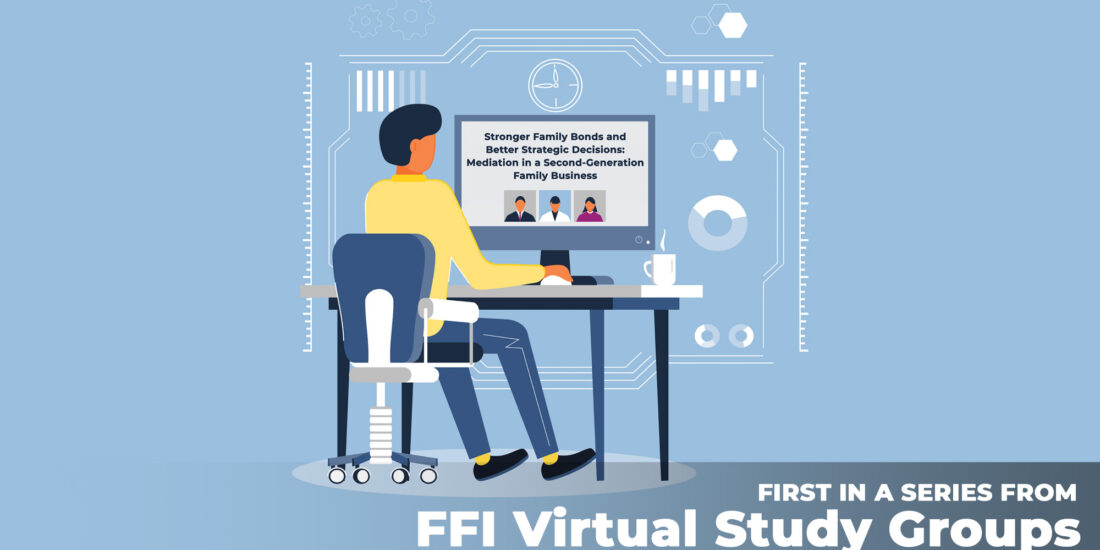As advisors, we see how fear grips family firms and interferes with the work we are hired to do. Decisions on issues like succession are delayed, and difficult conversations about wealth are avoided. We know what happens when those decisions and conversations are ignored, but how do we help our clients address fear in a constructive and meaningful way?
Fear in the family firm is a subject that’s very personal to me. My professional career began in my family’s company after college. I planned to stay one year and then apply to graduate school, but one year turned into 17. During that time, we grew the business to be the 5th largest printing company in our community. It’s an accomplishment I am especially proud to share. Despite the successes and the rewards, it was not the place for me, and we all knew it but didn’t know how to talk about it. Since leaving seven years ago, I’ve explored the emotion of fear. The following principles guide my work advising family firms.
Fear has value and purpose: Our first instinct is to avoid what we fear or minimize the feeling to the point of shaming ourselves or others. Platitudes like “Everything you want is on the other side of fear” or “What would you do if you’re weren’t afraid?” are not helpful and even insulting. Fear is real and trying to ignore it or smother it with positivity does not work. Fear tells us that risk is involved and that we should proceed with caution. Furthermore, ignoring it denies us the full range of our emotional experience. How much richer are our achievements when we remind ourselves of the difficulties we experienced working through our fear?
Everyone experiences fear differently: Until recently, science proposed there were dedicated circuits in the brain for emotions like fear, happiness, anger, and sadness. This implied a universal emotional experience but that view is changing. New research suggests that how we experience emotions like fear is shaped not only by our biology, but by our experience, culture, and context. Essentially, each of us feels fear differently, and we’re afraid of different things. Advisors see this firsthand. Some family firms view rapidly changing markets as opportunities for growth, while others view the same conditions as threats to their existing business.
The human brain craves certainty: Fear is rooted in the unknown and that troubles the human brain because the unknown requires extra energy. Consider that our brains take in immense stimuli every moment and that all of it must be processed. For efficiency, the brain continually forms mental models based on countless pieces of information. This is valuable in that we don’t have to continually relearn every time we encounter the same, or similar, situation. These models help us navigate the world faster and more efficiently and they tell us what dangers to avoid based on experience. Remember learning as a child not to put your hand on a hot stove? Another way the brain craves certainty is when we complete a task, our reward center is activated. When we avoid a task, our anxiety is tripped. Consider the satisfaction you feel with a to-do list of completed items. Simply put, our brain is a completion machine. And when we consider that fear involves the unknown, we have a clearer picture of why this is so difficult. It goes against our very nature as beings that crave certainty.
We experience more than just fear: It’s easy to focus solely on fear, yet rarely is it the only emotion involved. The founder of a family firm planning for succession feels fear around his or her mortality. Other emotions are also at play like pride in cementing one’s legacy, frustration with the countless decisions involved, excitement at the prospect of life after succession, and relief that the daily pressures of business will be lifted. Talking about those other emotions broadens one’s view of the current situation. This can reduce stress, reframe a negative to a positive and facilitate exploration of other options.
This deeper understanding of fear led me to develop the following strategies helpful in keeping clients engaged and on track:
Examine the evidence: As human beings, we constantly venture into the unknown. It’s how we learn and grow. Yet, we forget that what is now easy was once difficult. Before talking to clients about fear, I ask them to list significant accomplishments in the last 12 months and how they feel about those achievements NOW. Often, they’re proud of what they’ve done and even appreciate being reminded. Or, they downplay those accomplishments with statements like “Well it wasn’t that hard” and “I got lucky.” Then I ask how they felt BEFORE starting those activities and what they felt WHILE working on them. The answers are usually quite different. They share how hard it was to take the first step, how they procrastinated or how easy it was once they started. Remember how we assimilate new information to form mental models to help us navigate the world? Once we assimilate that information, it’s no longer new. It’s just the new normal. Taking time to remind clients not only of their accomplishments, but also of their perceived difficulty BEFORE starting reassures them that they’ve done this before and they can do it again.
Name it: Research suggests that labeling the emotion decreases anxiety and allows one to access more cognitive resources. Furthermore, the more emotions we can label, the more flexibility we have in managing the stress. I include a thinking/feeling/acting chart to help clients find the words to describe what they’re experiencing. Often the word “fear” does not describe accurately what they’re feeling, and seeing behaviors listed may help them see how they’re responding to a critical issue. Finally, naming the emotion serves the purpose of making the unknown known. Once it’s named, the easier it is to manage.
Recognize the benefits of fear: Fear tells us that we should be concerned. Fear generates energy that raises awareness to potential threats. Without fear, we may take unnecessary risks. Fear becomes problematic when we expend that energy avoiding the issue. The more we avoid it, the more energy we consume. Conducting a cost/benefit analysis of those risks moves the client from a feeling to a thinking state. Recall when you were told as a child not to do something. You probably found yourself fighting the urge to do it anyway. Fear is like that. The more we work to avoid it, the more powerful it becomes. Instead, help clients acknowledge their fear and the benefits it brings to understanding potential risks.
Practice courage: We think courage is a trait that belongs only to the brave. Instead, I suggest that my clients think of courage as a skill to be practiced. We take the results from the “Look at the Evidence” exercise a step further. We explore HOW they accomplished those things. Often many of the same strategies used to address previous challenges can be applied to new ones.
Start small and build momentum: Family firms engage our services because they seek change. Yet, as human beings we’re notoriously resistant, and we know that fear can derail our efforts to change. Rather than introducing a grand plan, consider small changes at first. Simply acknowledging and naming that the fear exists is minor, but makes the issue more known and hence less scary. It’s a small step that contributes to forming a more complete picture which, as we discussed, feeds the brain’s desire for completion and certainty.
It’s essential to remember that fear is ever present. It has value in that it protects us from potential risks. We will never overcome fear, but with open and thoughtful discussion, we can help the family firms we serve better manage it.
About the contributor
 Kyle Danner, CFBA, grew up in his family’s business and is now a family business advisor in Kansas City, MO. With a focus on helping families in business work better together so they can make the best decisions possible to enjoy a profitable business and each other, he combines personal experience with professional training to help others navigate the complex world of family business. Kyle can be reached at kyle@kyledanner.com.
Kyle Danner, CFBA, grew up in his family’s business and is now a family business advisor in Kansas City, MO. With a focus on helping families in business work better together so they can make the best decisions possible to enjoy a profitable business and each other, he combines personal experience with professional training to help others navigate the complex world of family business. Kyle can be reached at kyle@kyledanner.com.





